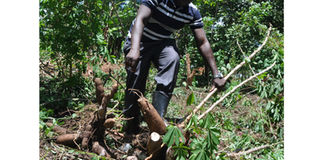Cassava, potatoes bring in the cash for lecturer

Alfred Okwonga in his garden with some harvested cassava. Photo by Tobbias Owiny
What you need to know:
- Besides cassava, Alfred Okwonga, who holds a master’s degree in public health from Makerere University, has cultivated various crops, including bananas, melons, oranges, mangoes and onions. But of all these, cassava which he grows on 10 acres, is his favourite because of its good returns, writes Tobbias Jolly Owiny.
Dressed in grey trousers, a blue stripped T-shirt and black gumboots, Alfred Okwonga walks in his cassava farm in Lujorongole, Lakwana Sub-county, Omoro District, harvesting some while also scouting for pests underneath the plant’s leaves.
It is on a Saturday, and as has become his routine, Okwonga has driven from Gulu School of Nursing in Gulu District — where he is a director and tutor — to the farm in Omoro, some 31 kilometres away to check on his crops.
“I juggle my work as a director, a lecturer, and farming, which I have been doing for the past five years,” says the farmer who is a lecturer at the Gulu School of Nursing.
Enterprises
Besides cassava, Okwonga, who holds a master’s degree in public health, has cultivated various crops, including bananas, melons, oranges, mangoes and onions. But of all these, cassava which he grows on 10 acres, is his favourite because of its good returns.
“I planted the crop first in 2005 and harvested more than 10 tonnes, making a good profit,” says the teacher who also holds a diploma in clinical medicine and community health from Mulago School of Medicine.
In 2006, he planted more than 1,000 seedlings of mangoes and oranges.
“I planned my project early although starting was quite capital-intensive. I invested more than Shs6m. Part of the money went to cultivating the
land and buying the seeds,” he says.
“I passionately love farming and I
cannot do without it. I make sure I balance between my professional job and the farm,” he says.
He says with a smile and pride as he walked a group of visitors through the cassava plantation inter-planted with bananas. The bananas have been on his farm for three years. He tells the visitors who are also farmers how to go over hurdles in farming.
Starting
“Upon graduating, I married so that while I worked as a clinical officer in Gulu between 2002 and 2005, part of my monthly salary would be invested in farming,” he said.
Besides his new family venturing into selling merchandise at that time, he says they would hire land in the suburbs of Gulu Town to plant beans and maize.
The produce realised enabled him to save money meant for feeding the family.
“The produce I realised from the land I bought and the two acres I hired enabled me to buy another acre the following year at Shs9m. The subsequent result was a big push for me and I decided with my wife to buy a mini tipper lorry at Shs14m to join the transport business,” he said.
Each year, he planted beans and cassava, the crops performed well due to the favourable conditions in the area.
“For three years when I started the harvests increased every season because I have been rotating.”
Between 2009 and 2014, Okwonga’s farm productivity went down as he concentrated in developing and expanding his school.
Challenges
His main challenge is diseases such as aphids, cassava mosaic and cassava steak diseases. Other diseases include, powdery mildew and anthracnose. Extension officers say one can overcome these by using proper farming methods, as well as use of copper-based fungicides, which can be applied through the drip irrigation system.
He is also faced by weather challenges. It has been very hard for him to maintain bananas and potatoes during drought since it is the time when potatoes get attacked by weevils most and the bananas wither out. This affects the quality of output realised from those crops, he said.
Marketing
Whatever Okwonga grows on his farm is bought by the school for student’s consumption.
In a week, he said he supplies cassava valued at between Shs800,000 to Shs1m to the school. Okwonga also supplies potatoes to the school. The school pays him Shs4m per truck.
However, mangoes and oranges are yet to begin fruiting, three years after they were planted.
According to him, the money he raises from cassava is much more than what it fetches from markets in Gulu town and other towns.
“In the market, the sellers buy a bag at Shs50,000 or Shs60,000 but sell out at more than Shs75,000. Mathematically it means that both the farm and the school saved something and this saving accumulates to raise staff salaries and arrears at the school and also workers at the farm.”




